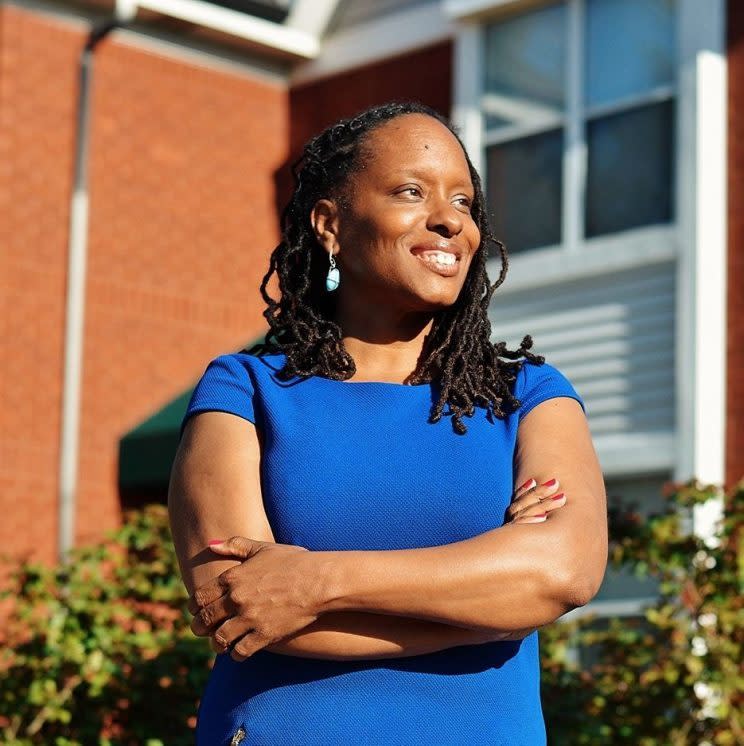A High School's New Anti-Natural-Hair Policy Is Causing Controversy

Controversy over the latest problematic school hair policy, this time at a Kentucky high school, is not about recede without a fight. Why? Because a true mover and shaker has taken up the cause: Attica Scott, an activist turned state representative, tweeted about the racist policy this week.
“Soooo … my daughter had registration today and let’s just say she’s not happy abt the #JCPS no natural hair policy,” tweeted Scott, who will run uncontested in November to become the first black woman elected to the Kentucky State Legislature in 20 years. She included a photo of the hair/personal grooming portion of the dress code at the Butler Traditional High School in Louisville, which states there are to be no “dreadlocks, cornrolls [sic], twists, mohawks” and no “Afros more than two inches in length.”
Scott’s daughter Ashanti, 15, will be entering her sophomore year at the Louisville public school.
Soooo…my daughter had registration today and let’s just say she’s not happy abt the #JCPS no natural hair policy. pic.twitter.com/ApPDyv3sbo
— Attica Scott (@atticascott) July 27, 2016
Scott’s initial comment has been retweeted more than 450 times and inspired a slew of supportive comments, including: “This policy tells children their natural hair is something to be embarrassed and ashamed over,” and “I have an issue with their inability to spell cornrows properly.” In an attempt to make her case more forcefully, Scott also tweeted images of highly successful public figures, including Oprah and Beyoncé, with their hair in braids.
.@HannahDrake628 pic.twitter.com/p4ouz9rCGs
— Attica Scott (@atticascott) July 28, 2016
Although the Jefferson Public County Schools District responded to Scott’s tweet with one if its own, noting that the high school has its own policy that is not the same as the district and that “there is a process for review,” critics were not willing to let the district off the hook. “There is also a process for a civil rights violation lawsuit. Just a friendly FYI,” noted one of many commenters, with another asking, “Does an African-American student’s hair in its natural state prevent/hinder instructional time?”

The school did, however, reach out to Scott, who will be meeting with the principal on Monday, just two days before classes start; Scott also contacted the district superintendent, she told Yahoo Beauty. “The district is passing responsibility on to one particular school, but as superintendent, you are responsible for all your schools,” she says.
She explained that on Wednesday, after going with her daughter to register and later reading through all the materials, Ashanti noticed the new, stricter policy and pointed it out. “I was like, oh my God, that would mean I wouldn’t be able to wear my hair to the school, which is in locs,” Scott recalls. “To me, the clear message is, ‘Your culture and heritage is not welcome here, and we will police your hair rather than focus on your education.’”
Ashanti told Yahoo Beauty that when she first noticed the policy, “I felt very offended, because right before the part about braids and locs, it said that your hair must be ‘neat and clean,’ which implies that these styles are not.” Plus, she says, “I was surprised that the wording was so blatant,” adding, “Everybody knows that I was ‘that freshman girl with the big Afro.’”
Stories about kids being told to change their hairstyles pop up regularly — such as those about teens in Georgia and Florida who were singled out for having their hair dyed an “unnatural color.” More racially charged incidents have included that of a Texas mom citing racism after her third grader who was sent home for having her hair in Afro puffs, leading to a school policy change; and a girl in the Bahamas who was suspended over her Afro puff in February, prompting a #SupportThePuff social media campaign. In 2014, a 12-year-old private school student in Florida blew up the Internet over reports that she was threatened with expulsion over her naturally “puffy” hair being a “distraction.” The school eventually relented.
Scott’s response to these sorts of controversial policies? “When you take away students’ ability to express themselves this way,” whether through gender expression or standards of beauty, she says, “we’re taking away their ability to be who they are and who they are meant to be.”
Let’s keep in touch! Follow Yahoo Beauty on Facebook, Twitter, Instagram, and Pinterest.




